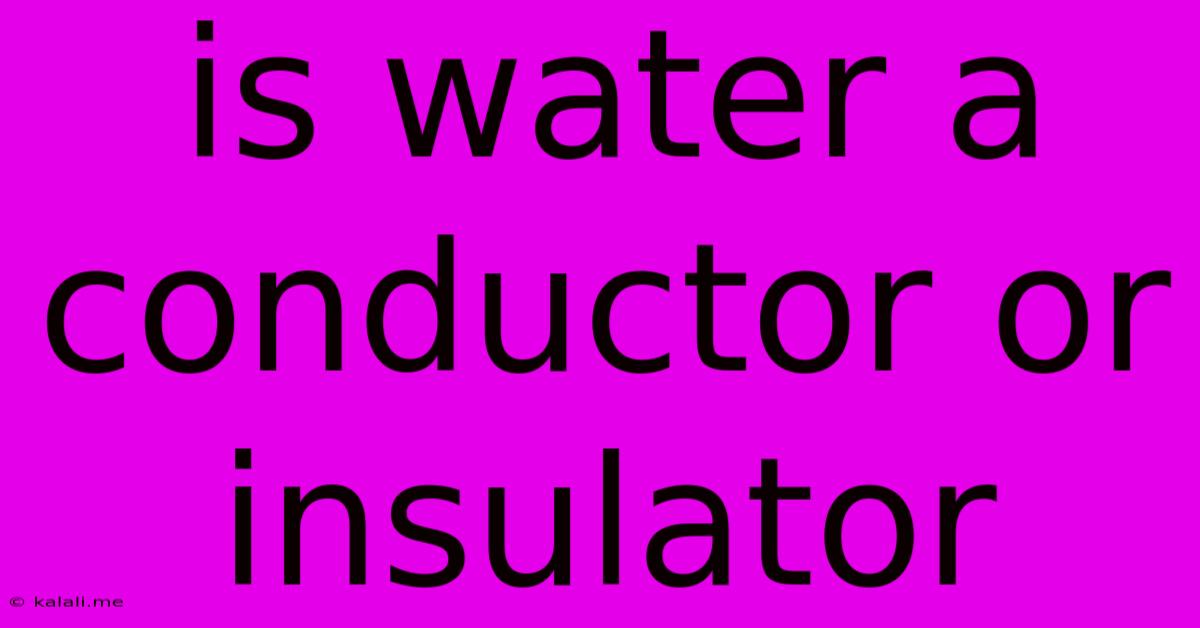Is Water A Conductor Or Insulator
Kalali
Jun 04, 2025 · 3 min read

Table of Contents
Is Water a Conductor or an Insulator? It's Complicated!
Meta Description: Water's conductivity is a complex issue, depending heavily on its purity. Learn whether pure water is an insulator, and how impurities transform it into a conductor. Discover the science behind this fascinating property!
Water's role as a conductor or insulator is a surprisingly nuanced topic. The simple answer is: it depends. Pure water is actually a fairly good insulator, but the presence of even minuscule amounts of dissolved impurities drastically alters its electrical behavior, turning it into a surprisingly effective conductor. This article will delve into the science behind this fascinating characteristic.
Understanding Electrical Conductivity
Before exploring water's conductivity, let's establish the basics. Electrical conductivity refers to a material's ability to allow the flow of electric current. This flow is facilitated by the movement of charged particles, typically electrons or ions. Good conductors have abundant free-moving charged particles, while insulators have very few.
Pure Water: A Surprisingly Good Insulator
Pure water (H₂O), devoid of any dissolved ions or other impurities, is a poor conductor of electricity. This is because water molecules themselves are electrically neutral. They don't readily release electrons or form ions that can carry an electrical current. In a perfectly pure state, water acts as an insulator, resisting the flow of electricity.
The Impact of Impurities: Turning Water into a Conductor
The presence of even trace amounts of dissolved substances significantly changes water's electrical properties. Many substances, when dissolved in water, dissociate into ions—charged atoms or molecules. These ions become mobile charge carriers, dramatically increasing the water's conductivity.
-
Dissolved Salts: Common table salt (sodium chloride, NaCl) readily dissolves in water, dissociating into positively charged sodium ions (Na⁺) and negatively charged chloride ions (Cl⁻). These ions readily carry an electric current, making saltwater a relatively good conductor. This is why you should never handle electrical appliances near water, especially if it's not pure.
-
Minerals: Natural water sources often contain dissolved minerals like calcium, magnesium, and other ions. These minerals contribute to the water's conductivity. The higher the mineral content, the higher the conductivity.
-
Acids and Bases: Acids and bases also dissociate into ions in water, significantly increasing its conductivity. The strength of the acid or base directly impacts the extent of this increase.
-
Contaminants: Other dissolved impurities, such as pollutants and organic matter, can also contribute to increased conductivity.
Measuring Water Conductivity
The conductivity of water is measured in Siemens per meter (S/m) or microSiemens per centimeter (µS/cm). Pure water has a very low conductivity, while highly conductive water, such as saltwater, has a significantly higher value. This measurement is crucial in various applications, including environmental monitoring, water quality assessment, and industrial processes.
Practical Implications
Understanding water's conductivity is crucial in many areas:
- Safety: Never touch electrical appliances with wet hands, especially near water sources. The presence of impurities in the water can make it a conductor, leading to electric shock.
- Electronics: Water's conductivity is a major concern in the design and manufacturing of electronic devices. Water damage can short-circuit sensitive components.
- Industrial Processes: Conductivity measurements are used to monitor and control water quality in industrial applications, including power generation and chemical processing.
In conclusion, the question of whether water is a conductor or insulator isn't straightforward. While pure water is an insulator, the presence of even minimal impurities transforms it into a conductor. Understanding this fundamental property is vital for safety and various applications across multiple fields.
Latest Posts
Latest Posts
-
Move Files From Subfolders To One Folder Terminal
Jun 06, 2025
-
Hopw To Fix Iphone Overhear Every 2 Minutes
Jun 06, 2025
-
How Long Does It Take To Grow Sugar Cane
Jun 06, 2025
-
When Someone Gives Multiple Answers To One Question Meaning
Jun 06, 2025
-
Throttle Linkage Kohler Carburetor Linkage Diagram
Jun 06, 2025
Related Post
Thank you for visiting our website which covers about Is Water A Conductor Or Insulator . We hope the information provided has been useful to you. Feel free to contact us if you have any questions or need further assistance. See you next time and don't miss to bookmark.